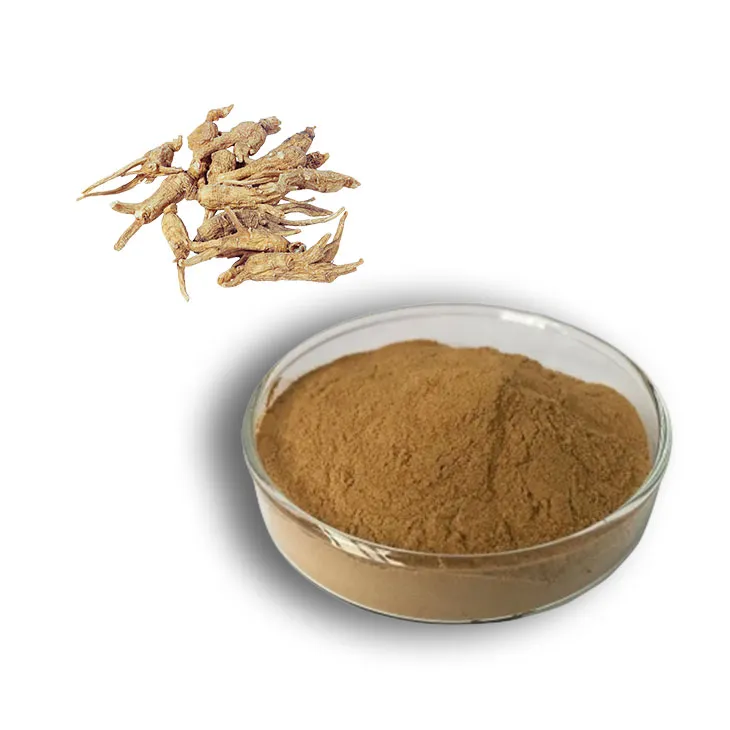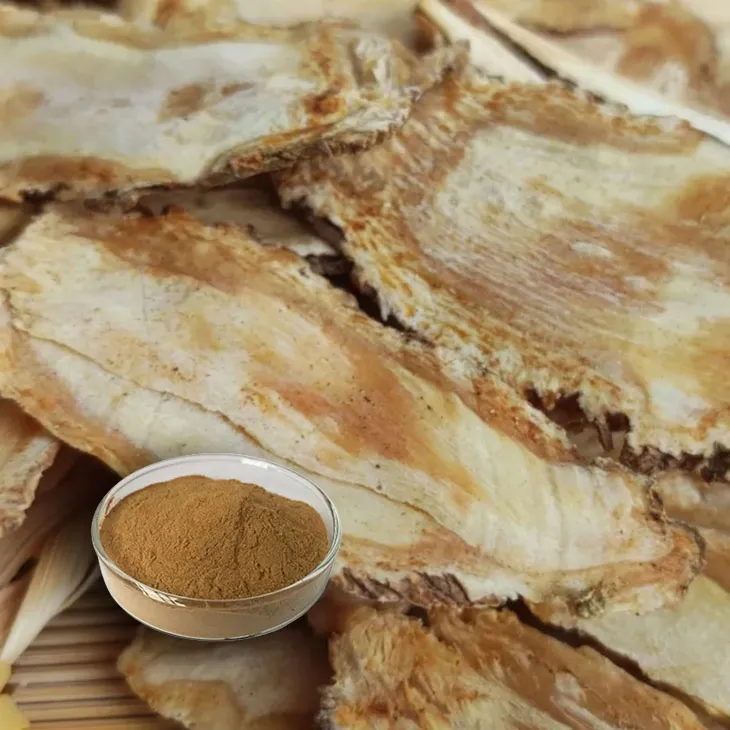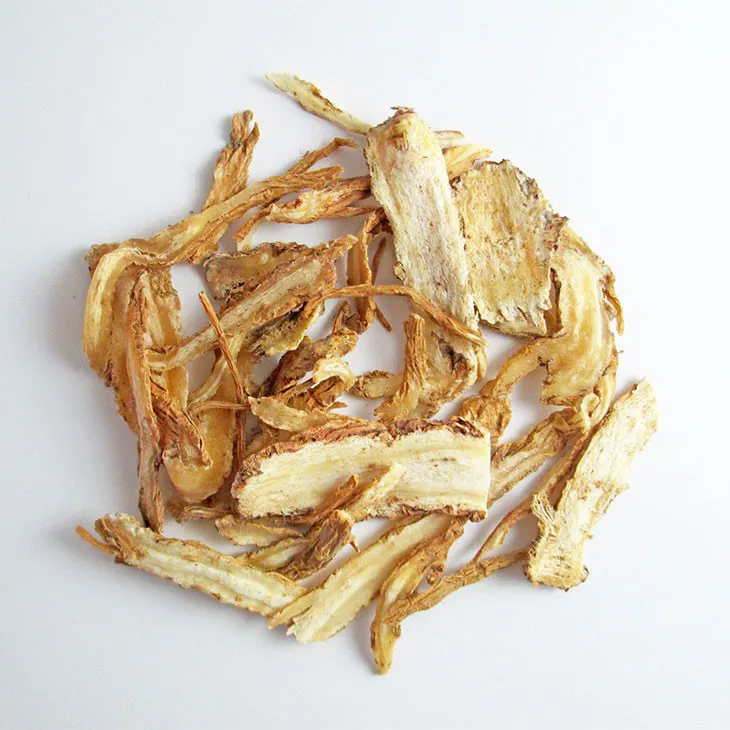- 0086-571-85302990
- sales@greenskybio.com
Carbon Dioxide Extract of Organic Angelica sinensis Extract.
2024-12-11

1. Introduction to Organic Angelica sinensis
Organic Angelica sinensis, known as Dong Quai in some regions, has a long - standing history in traditional medicine. It is a herbaceous plant that has been highly valued for its potential medicinal properties. This plant is native to certain areas in Asia and has been used for centuries in traditional Chinese medicine and other Asian medical systems.

2. The Carbon Dioxide Extraction Method
The carbon dioxide extraction method is a modern and efficient technique for obtaining extracts from plants. It is considered a clean method as it does not leave behind harmful residues. Carbon dioxide, in its supercritical state, has properties that allow it to effectively dissolve the active compounds from the Angelica sinensis plant. This process can be precisely controlled to ensure the extraction of a wide range of bioactive substances while maintaining their integrity and potency.

3. Bioactive Substances in the Extract
3.1 Phthalides
Phthalides are an important group of compounds found in the carbon dioxide extract of Angelica sinensis. They are believed to play a significant role in the extract's potential health - promoting effects. For example, they may contribute to the anti - inflammatory properties of the extract. Research has shown that phthalides can interact with certain cellular pathways in the body to reduce inflammation, which is associated with many chronic diseases.
3.2 Polysaccharides
Polysaccharides are another key component of the Angelica sinensis extract. These complex carbohydrates have various functions in the body. They are known for their immunomodulatory effects, which means they can help regulate the immune system. In addition, polysaccharides may also contribute to the overall antioxidant activity of the extract. They can scavenge free radicals in the body, protecting cells from oxidative damage.
3.3 Flavonoids
Flavonoids are a large class of plant - derived compounds that are present in the Angelica sinensis extract. Flavonoids are well - known for their antioxidant properties. They can neutralize free radicals, which are unstable molecules that can cause damage to cells, DNA, and proteins. Moreover, flavonoids may also have other beneficial effects such as anti - microbial and anti - cancer activities, although more research is needed to fully understand these potential functions in the context of Angelica sinensis extract.

4. Potential Health - Promoting Effects
4.1 Anti - inflammatory Effects
The combination of phthalides, polysaccharides, and other bioactive substances in the Angelica sinensis extract gives it potential anti - inflammatory properties. Chronic inflammation is linked to numerous health problems, including heart disease, arthritis, and certain cancers. By reducing inflammation, the extract may help prevent or manage these conditions. In vitro and in vivo studies have shown that the extract can inhibit the production of pro - inflammatory cytokines and mediators, which are key players in the inflammatory process.
4.2 Antioxidant Effects
As mentioned, the presence of polysaccharides and flavonoids in the extract endows it with strong antioxidant capabilities. Antioxidants are essential for maintaining the health of cells and tissues. They protect against oxidative stress, which occurs when there is an imbalance between the production of free radicals and the body's ability to neutralize them. Oxidative stress has been implicated in the development of aging - related diseases, neurodegenerative disorders, and cardiovascular diseases. The antioxidant activity of the Angelica sinensis extract may help delay the onset of these diseases and improve overall health.
4.3 Hormonal Regulation
The Angelica sinensis extract may also play a role in hormonal regulation. In traditional medicine, it has been used to address women's health issues, particularly those related to the menstrual cycle and menopause. It is believed that the extract can help balance estrogen levels in the body. Estrogen is a key hormone in women's health, and imbalances can lead to symptoms such as irregular menstrual periods, hot flashes, and mood swings. While more research is needed to fully understand the mechanisms underlying its hormonal regulation effects, the historical use of Angelica sinensis in traditional medicine for these purposes provides a basis for further investigation.
5. Applications in Different Fields
5.1 Cosmetics
In the field of cosmetics, the carbon dioxide extract of Angelica sinensis has several potential applications. It can be used to improve skin condition. The extract's antioxidant and anti - inflammatory properties can help protect the skin from environmental damage, such as UV radiation and pollution. It may also enhance skin elasticity by promoting the production of collagen and elastin, which are important proteins for maintaining the firmness and elasticity of the skin. Additionally, the extract can help reduce wrinkles by improving the overall health of the skin cells and reducing the appearance of fine lines.
- Protect skin from environmental damage
- Promote collagen and elastin production
- Reduce the appearance of wrinkles
5.2 Nutraceuticals
In the realm of nutraceuticals, the Angelica sinensis extract offers potential benefits for women's health. As mentioned earlier, it may be useful for menstrual regulation. By helping to balance hormones, it can potentially alleviate symptoms such as menstrual cramps, irregular periods, and pre - menstrual syndrome (PMS). For women going through menopause, the extract may also provide relief from menopausal symptoms such as hot flashes, night sweats, and mood changes. Additionally, the overall antioxidant and anti - inflammatory properties of the extract can contribute to general health and well - being.
- Alleviate menstrual cramps
- Relieve menopausal symptoms
- Contribute to general health
5.3 Traditional Herbal Medicine
In traditional herbal medicine, Angelica sinensis has a long - established role. It is often used as a tonic to invigorate blood and regulate qi. In traditional Chinese medicine theory, blood stasis and qi stagnation are considered to be underlying causes of many health problems. By promoting blood circulation and regulating the flow of qi (vital energy), Angelica sinensis is believed to help restore balance in the body and treat a variety of ailments. It is commonly used in formulas for treating menstrual disorders, anemia, and general weakness.
- Treat menstrual disorders
- Alleviate anemia
- Relieve general weakness
6. Conclusion
The carbon dioxide extract of organic Angelica sinensis is a valuable natural product with a wide range of potential applications. Its rich composition of bioactive substances, including phthalides, polysaccharides, and flavonoids, gives it multiple health - promoting effects such as anti - inflammatory, antioxidant, and hormonal regulation properties. These properties make it useful in cosmetics, nutraceuticals, and traditional herbal medicine. However, further research is still needed to fully understand the mechanisms of action of these bioactive substances and to ensure the safety and efficacy of the extract in various applications. As interest in natural products continues to grow, the potential of Angelica sinensis extract is likely to be further explored and developed in the future.
FAQ:
What are the main bioactive substances in the Carbon Dioxide Extract of Organic Angelica sinensis Extract?
The main bioactive substances in the Carbon Dioxide Extract of Organic Angelica sinensis Extract include phthalides, polysaccharides, and flavonoids.
What are the potential health - promoting effects of the Carbon Dioxide Extract of Organic Angelica sinensis Extract?
The potential health - promoting effects include anti - inflammatory, antioxidant, and hormonal regulation properties. It can also support women's health, especially for menstrual regulation and menopausal symptom relief. Additionally, in traditional medicine, it is used as a tonic to invigorate blood and regulate qi.
How is the Carbon Dioxide Extract of Organic Angelica sinensis Extract used in cosmetics?
In cosmetics, it can improve skin condition, enhance skin elasticity, and reduce wrinkles.
What makes the carbon dioxide extraction method special for obtaining Organic Angelica sinensis Extract?
The carbon dioxide extraction method is a clean and efficient way to isolate the active compounds from the herb.
Is the Carbon Dioxide Extract of Organic Angelica sinensis Extract safe to use?
While it has been used in various fields such as cosmetics, nutraceuticals, and traditional herbal medicine, its safety also depends on proper usage, dosage, and quality control. However, generally, when used appropriately, it is considered relatively safe due to its natural origin. But more research may still be needed to fully confirm its long - term safety in all applications.
Related literature
- The Chemical Constituents and Pharmacological Effects of Angelica sinensis"
- "Carbon Dioxide Extraction Technology in Herbal Medicine: A Review"
- "Bioactive Compounds from Angelica sinensis and Their Applications in Health and Cosmetics"
- ▶ Hesperidin
- ▶ citrus bioflavonoids
- ▶ plant extract
- ▶ lycopene
- ▶ Diosmin
- ▶ Grape seed extract
- ▶ Sea buckthorn Juice Powder
- ▶ Beetroot powder
- ▶ Hops Extract
- ▶ Artichoke Extract
- ▶ Reishi mushroom extract
- ▶ Astaxanthin
- ▶ Green Tea Extract
- ▶ Curcumin Extract
- ▶ Horse Chestnut Extract
- ▶ Other Problems
- ▶ Boswellia Serrata Extract
- ▶ Resveratrol Extract
- ▶ Marigold Extract
- ▶ Grape Leaf Extract
- ▶ blog3
- ▶ blog4
- ▶ blog5
-
Pure 85% Tomentil Extract.
2024-12-11
-
Bitter Melon Extract
2024-12-11
-
Propolis Extract Powder
2024-12-11
-
Withania Somnifera Extract
2024-12-11
-
Peppermint Oil
2024-12-11
-
Stevia Extract
2024-12-11
-
Europen Bilberry Extract
2024-12-11
-
Aguaje Extract
2024-12-11
-
Medicinal Marshmallow Extract
2024-12-11
-
Cactus Extract
2024-12-11
-
Phellodendron Extract
2024-12-11





















